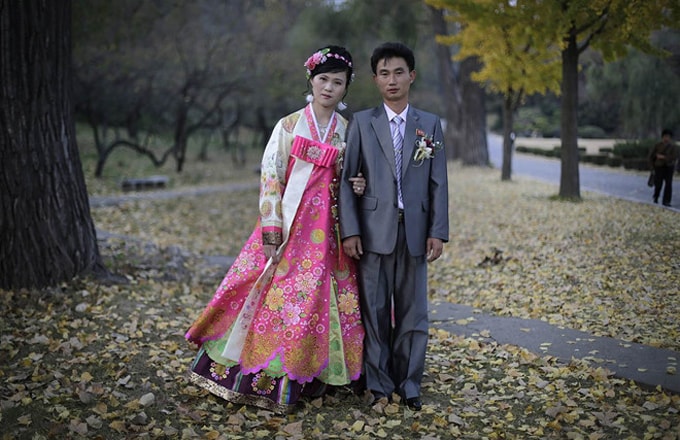Special rules in weddings in North Korea
Weddings always have a rooster and hen, do not take place on the birthdays of former leaders, and the bride and groom do not go on a honeymoon after marriage.
|
A North Korean couple takes wedding photos. Photo: AP |
According to the newspaperGuardian, weddings in North Korea do not have bouquet toss, instead couples will bring flowers to the statue of late leader Kim Il Sung to pay their respects as soon as the wedding ceremonies end.
Wedding photos are also taken at the statue of the late leader. Although this is not compulsory, most North Korean couples feel obliged to do so. There is also an important rule: couples cannot get married on April 15 or February 16 because those are the birthdays of the late leaders Kim Il-sung and Kim Jong-il, respectively.
Most wedding ceremonies are still held in the traditional way, passed down from generation to generation. Korean films depict the bride wearing traditional hanbok clothes. According toNK News- specialized publications on North Korea,The hanbok is white with bright floral embroidery or the hanbok is pink, red and yellow. Neighbors and relatives come to congratulate the wedding, enjoy wine and food just like in the movie.
For laborers and farmers who cannot afford to buy wedding gifts, it is common for them to pay to rent some food from the market, take pictures and then return it.
For the wealthier, wedding gifts are often envelopes of cash. Officials often give US dollars. Luxury watches are also a favorite wedding gift for the rich in this country.
The strange thing is that hens and roosters are always present at Korean weddings according to ancient customs. The hens are given flowers in their mouths and the roosters are given chili peppers. The hens and roosters are wrapped in red and blue cloths respectively and placed on the ceremonial table.
For officials, weddings are an opportunity to show their importance, so they often hold large-scale weddings. Children's weddings are also an opportunity for upper-class families to show off their family background. Therefore, both sides often try to invite as many guests as possible to the party. The rows of cars parked outside the wedding venue reflect the family's influence and status in North Korea.
Unlike in many countries where newlyweds often go on their honeymoon, in North Korea, if you get married today, you still have to go to work tomorrow.

